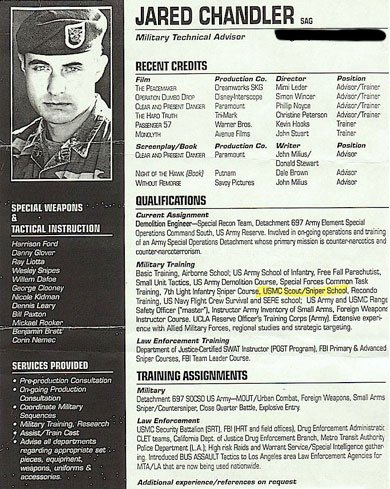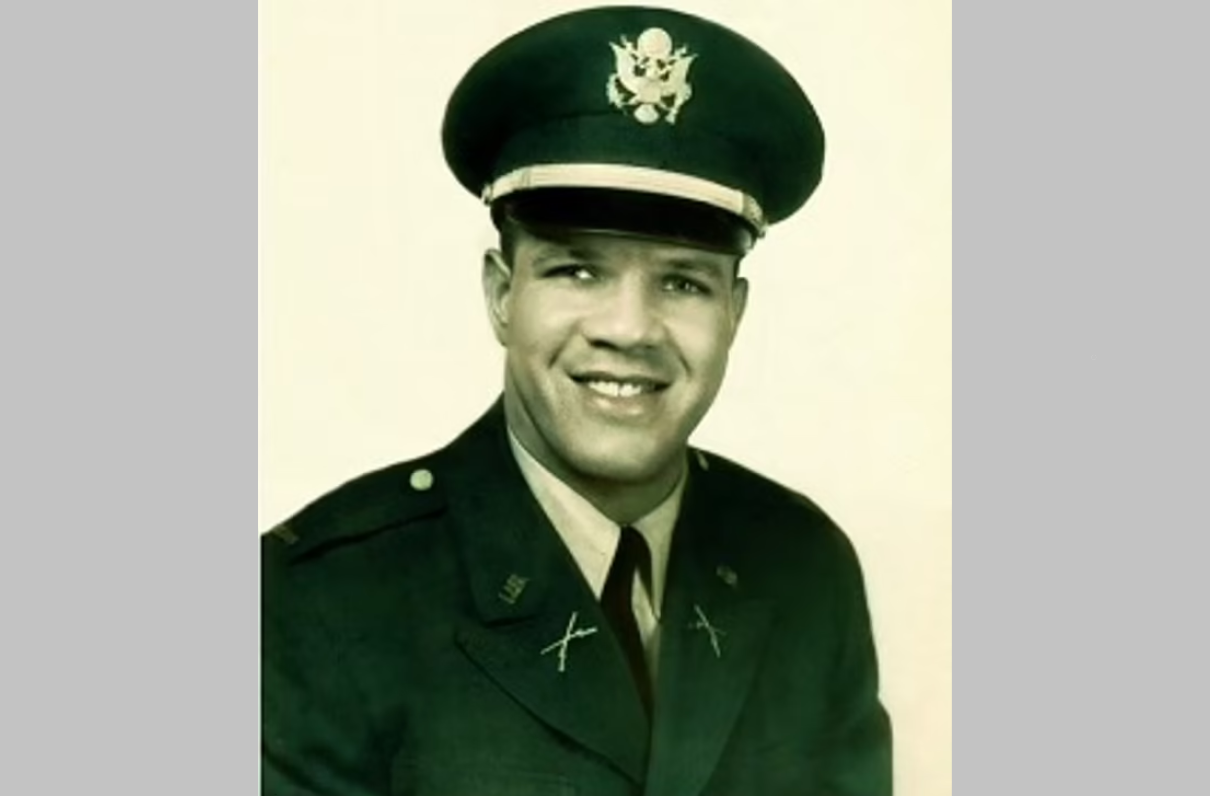Jared Chandler UPDATED - wannabe Special Forces in Hollywood and his buddies Goyen, Anderson
/The article below will give some details.
But first context: I was in business with these three guys when I first arrived in Hollywood - they came recommended from a Ranger turned actor. After a few months I felt something was off. The reserve SOCOM unit they professed to belong to was a fake - an admin unit only - no drills nothing but was turned into an active reserve component by Captain Steve Goyen. He assembled a number of former SF or military guys for drills etc. He was in bed with some members of the LAPD, managed to convince law enforcement and military to let them train their people. So some real stupid shit. They also used military purchasing programs to upgrade their uniforms, equipment and weapons under the guise of this non-existing unit for Hollywood where they worked as tech advisors.
Below are articles and some links and a resume from Jared Chandler (actor New Monkees) whose actual legit military training was 3 weeks at Airborne School as an incentive from UCLA ROTC for him to sign up - he did not. Never went to BASIC, AIT or any legit school. They did attend some military/cop courses etc while they were bullshitting their way through law enforcement and military circles. Goyen was a legit reserve Captain, Anderson a legit former Green Beret with a shit discharge but Chandler was a total fraud, encouraged and supported by both. Eventually the Feds figured this one out. Goyen plead guilty and died a few years later of cancer, Anderson managed to get slapped on his wrist and still works in stunts, and Chandler, from what I was told, made a deal and ratted out the other two to avoid anything serious. Chandler still works as tech advisor and costume guy in Hollywood. Other tech advisors like SEAL Harry Humphreys, Marine James Dever, Marine Dale Dye know about this fraud but said and say nothing sometimes calling me to get Jared bumped off a show they wanted to get on (I only did this once) - Hollywood you know. Chandler was very well connected including to Milius, Neufeld etc.. he had strong support from executives - curious if this happened today how fast they’d dump him? More stuff below.
Film Props at Center of Army Legal Drama
BY DAVID ROBB
https://www.latimes.com/archives/la-xpm-2003-may-10-fi-machineguns10-story.html
MAY 10, 2003 12 AM PT
SPECIAL TO THE TIMES
It would make a great plot for a movie: A former Army sergeant, a onetime Army Reserve captain and their Army-wannabe buddy find post-military success as stuntmen, technical advisors and owners of a thriving movie-prop business.
Except that this one might have a bad ending.
The captain, Steve Goyen, surrendered to FBI agents in mid-March after being charged in a 16-count federal indictment with falsifying military documents as part of a scheme to illegally obtain weapons and equipment to rent to the movie industry.
The former sergeant, Matthew Robert Anderson, turned himself in to FBI officials this week and stands accused of similar charges in a criminal complaint filed in March in federal court in Los Angeles. The buddy, Jared Jeffrey Chandler -- who allegedly never served in the Army despite a resume that claims he did -- was also named in the complaint.
The trio, operating out of Burbank, used their military know-how and Hollywood connections to build a profitable business catering to the movie industry, according to court papers.
Although the complaint doesn’t say how many producers leased those weapons and equipment, it says a large Army mechanic’s toolbox that Goyen allegedly requisitioned with false documents and then rented for $200 a week appeared in the 1997 film “McHale’s Navy.”
Federal officials declined to comment on the case. Officials at the Army’s Criminal Investigation Division at Ft. Irwin, the FBI, the U.S. attorney’s office and the Bureau of Alcohol, Tobacco and Firearms have been investigating the case for more than three years, tracking the path of automatic weapons and other military hardware from the Army that found their way onto the Hollywood black market and into numerous movie productions.
Although many aspects of the alleged scam remain vague, one thing appears clear: There was plenty of demand in Hollywood.
Movie producers who receive approval from the Defense Department can get all the military equipment and weaponry they want for their films at little or no cost.
But those who make military-themed movies that the Pentagon doesn’t like -- such as “The General’s Daughter,” which depicted rape and murder at an Army installation -- have to find military equipment elsewhere. They can either make their own props or rent expensive weapons and equipment from a handful of Hollywood prop houses.
That’s where Goyen, Anderson and Chandler came in.
The three men operated together in a now-disbanded Army Reserve unit that provided office workers for the Army’s Special Operations Command South, now headquartered in Puerto Rico. Goyen was the commanding officer and Anderson was the supply sergeant. Chandler was a “self-described sergeant” who was “never legitimately authorized to be in the military,” according to the complaint.
The trio obtained dozens of automatic weapons from licensed manufacturers by falsifying Army procurement orders, saying they needed the weapons to conduct counter-narcotics and counterterrorism training, according to the complaint. On at least one occasion, the defendants allegedly “conducted unauthorized combat missions that were videotaped by ‘Hollywood’ friends of Goyen.”
The Reserve unit had a tiny two-room office in the National Guard Armory in Burbank, and not much else. The Army didn’t allow the unit to procure or train with weapons.
Yet Goyen, Anderson and Chandler allegedly used false papers and stolen military procurement codes to obtain surplus military equipment from the Defense Marketing Reutilization Office, including helmets, parachutes, radios, body armor, food rations, sleeping bags, “dummy” blocks of C-4 explosives, detonation cord and triggering devices.
The complaint said Goyen had been trying to obtain weapons using falsified documents as far back as 1993. But it was in early 1998 when he, Anderson and Chandler set up their business in an existing prop house in Burbank called Gibbons Ltd., whose owner, Mike Gibbons, is a licensed firearms dealer and a leading supplier of military props to the movie industry.
The trio named its new venture SWAG, an acronym for Special Warfare Advisory Group. (The term is also slang for stolen goods, and in Mafia parlance means “stolen without a gun.”)
Gibbons stored some of the automatic weapons provided by the three men at his shop, thinking they were being used for legitimate purposes by the Reserve unit, according to the indictment.
He also gave the defendants space in his warehouse to rent their other military gear to movie productions. Gibbons is not a defendant in the case, and he declined to comment.
Goyen, in a brief telephone interview, denied the charges. “They’re all completely false,” he said. “Ridiculous and false.”
Anderson, a former Army Special Forces sergeant who fought in Operation Desert Storm, received an “other than honorable” discharge in 1991 after he was caught trying to smuggle several captured Iraqi weapons into the U.S. upon his return from Kuwait.
Since then, he has appeared in several action films as an actor and stuntman, and worked as a property master on such films as “Bloodfist VI: Ground Zero” and “A Bedfull of Foreigners.” Anderson did not return numerous telephone calls seeking comment.
Chandler was probably the best-connected of the three in Hollywood.
He had landed small roles in several movies and was a longtime friend of writer-director John Milius, who co-wrote the 1979 hit “Apocalypse Now,” according to industry sources. Before long, Chandler was working as a military technical advisor and weapons expert on films including 1994’s “Clear and Present Danger,” starring Harrison Ford, and “The General’s Daughter,” the 1999 movie that starred John Travolta.
In each instance, he presented a resume that claimed that he was, or had been, a sergeant in the Army Reserve. But the claim was phony, according to the criminal complaint.
Chandler declined to comment.
The Army disbanded the unit in May 2000 after its probe began to uncover more evidence of suspected improprieties.
Goyen is free on bail, and a trial date has been set for May 27. Anderson was released on $15,000 bail and is scheduled for a pre-indictment hearing in federal court in Los Angeles on the same day. Chandler hasn’t been arrested.
Guilty Plea by Goyen
MINUTES OF CHANGE OF PLEA HEARING held before Judge Ronald Lew as to Steve Goyen : Defendant moves to change plea to the Indictment. Plea of guilty entered by Steve Goyen (1) count(s) 2, 12, 14, 15 . The Court questions the defendant regarding plea of guilty and finds it knowledgeable and voluntary and orders the plea accepted and entered. The Court refers Steve Goyen to the Probation Office for investigation and report. Case is continued to 10:00 a.m. on 1/12/04 for sentencing. C/R: Sheri Ogata (dmap) (Entered: 10/07/2003)
Also -
BOND AND CONDITIONS OF RELEASE filed as to Steve Goyen, in the amount of: $10,000 with Affidavit of Surety no Justification by defendants father. By 3/13/03, you shall surrender to the Clerk of Court all passports issued to you or sign a declaration and not apply for issuance of a passport during the pendency of this case. Conditions of Release Pretrial Services Supervision. Travel is restricted to Central District of California. Do not enter premises of any airport, seaport, or terminal which permits exit from the continental U.S. without Court permission. Do not enter premises of any bus, railroad, airport, or seaport terminal which permits exit from area of restricted travel without Court permission. You are to reside with as approved by PSA. Maintain or actively seek employment and/or maintain or commence an educational program and provide proof to PSA. Avoid all contact, directly or indirectly, with any person who is or who may become a victim or potential witness in the subject investigation or prosecution, including but not limited to: David Thomas, Dan Fetterly, Kristen Sorensen, John Tiffany, James Cragg, Adolfo Nunez, Alex Nurse, Jared Chandler, Matthew Anderson. Not possess firearm, ammunition, destructive device, or other dangerous weapons. Held in abeyance until 4pm 3/13/03. In order to determine compliance, you will agree to submit to a search of your person and/or property by Orance County Jim Crelly, Oxnard PD. will retrieve all firearms from defendants residence and convey them to Special Agent Ballard, FBI (if such firearms exist). Approved by Magistrate Judge Jeffrey W. Johnson. Original bond routed to: FILE [ 2:03-m -508 ] (roz) (Entered: 03/19/2003)
MINUTES OF SENTENCING held before Judge Ronald Lew as to Steve Goyen (1) count(s) 2, 12, 14, 15. Probation three (3) years. This terms consists of three years on all counts, to be served concurrently under the terms and conditions of the United States Probation Office and General Order 318. Special assessment $400. Pursuant to 18:3664(d)(5), the Court defers the determination of restitution for 90 days from todays sentencing. Dismissing count(s) as to Steve Goyen (1) count(s) 1, 3-11, 13, 16. The governments motion to dismiss remaining counts is GRANTED by the Court. Court advises Steve Goyen of right to appeal. termed case C/R: Sheri Kleeger (roz) (Entered: 03/15/2006)— https://www.plainsite.org/dockets/369p98lgj/california-central-district-court/usa-v-goyen/
And here he is spouting more bullshit and lies…






